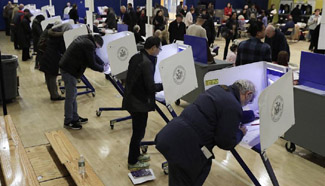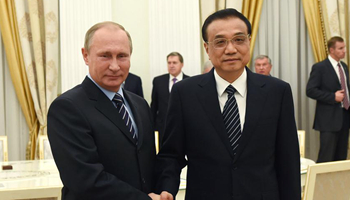by Xinhua writer Wang Haiqing
BEIJING, Nov. 9 (Xinhua) -- The relationship between China and the United States has by and large moved forward over the past eight years, and as U.S. President-elect Donald Trump prepares to take over in Washington, he should work to maintain that momentum so that the world's most important bilateral relationship continues to advance.
China-U.S. ties have witnessed remarkable progress since the ice-breaking visit to China in 1972 by then U.S. President Richard Nixon to establish a relationship that in the decades to come would have global consequences. That is why Beijing and Washington have also demonstrated an unmistakable desire in recent years to improve communication and better cooperate with each other.
Meetings between top leaders are often seen as a barometer of bilateral ties. The long walks and conversations conducted in a hearty atmosphere between Chinese President Xi Jinping and U.S. President Barack Obama on several occasions were evident of growing China-U.S. ties.
In the past three years since the Sunnylands summit, China and the United States have achieved new highs in bilateral trade, two-way investment, and personnel exchanges. They have also scored progress in establishing a bilateral investment treaty, made headway strengthening mutual trust between the two militaries and achieved some breakthroughs regarding cyber security cooperation.
Working hand in hand, and with other global players, the two countries signed a historic climate deal and jointly brought the Iran nuclear issue to a positive end through diplomacy.
Of course, the relationship between the world's top two economies isn't without friction.
Washington's rebalance to the Asia-Pacific, under which it plans to relocate a large part of its diplomatic and military resources to the region, is widely interpreted as targeting China.
While Washington has done little to dispel such doubts in Beijing, its warships, not long after the announcement of the pivot, have begun to appear in the South China Sea at an increasingly higher frequency, all under the false pretext of maintaining "freedom of navigation" in the area.
Such actions have emboldened some claimants in the South China Sea, effectively stirring up tensions in the mostly peaceful Asia-Pacific region and dimming the prospect of a peaceful solution to the region's maritime disputes.
China has repeatedly said it welcomes the United States to play a constructive role in the Asia-Pacific, and stressed that the Pacific is vast enough to accommodate both.
While the two sides will always have disagreements, they are definitely not stuck in a zero sum game.
By properly managing their disputes and working to enhance mutual trust, the incoming U.S. government and Beijing can jointly build a new paradigm of major power relations.










